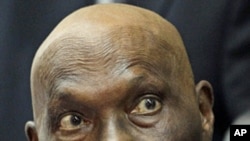Senegalese President Abdoulaye Wade says he has not ruled out the possibility of victory in a first round of presidential vote held Sunday, following weeks of protests calling his candidacy is unconstitutional.
Senegal's 85-year-old incumbent president told journalists on Monday that provisional results from half of the country's 551 voting districts put him in the lead with more than 32 percent of the vote.
Wade said that an outright victory or a second round of voting is possible. In the case of a second round, he said his party would explore alliances with all political forces in the country in the interest of enlarging its base of support and ensuring victory.
Analysts say it is likely that Senegal is headed for a runoff election.
Wade currently faces 13 opponents in his bid for a third mandate. He said Monday night that provisional results show former Prime Minister Macky Sall behind him with about 25 percent of the vote.
Sall says he is confident of winning in a second round.
"I am very hopeful because I will have all the opposition side and half of the ruling party," said Sall.
Voting was calm Sunday in the seaside capital, in contrast to the weeks leading up to the election.
Anti-government demonstrators clashed with police in Dakar as they demanded that President Wade withdraw his bid for a third term. The violence left at least six people dead.
Protesters say a reform Wade signed into law in 2001 limits presidents to two terms in office. But the Constitutional Court ruled that the reform does not apply retroactively to Wade's first term.
The pre-electoral violence was out of character for this stable democracy in West Africa, a part of the world often dominated by coups and civil conflict.
The U.N. Secretary General's special representative to West Africa, Said Djinnit, has congratulated Senegal on a peaceful election, saying it again demonstrated Senegal's "political maturity." He called on politicians to continue to exercise the same "restraint" throughout the rest of the process.
President Wade said the poll showed a Senegal still "solidly anchored in the limited circle of modern, mature and peaceful democracies."
Wade said that by performing this civic duty, the Senegalese people have disproved all of those who feared disaster. Abdoulaye Wade was the country's main opposition leader for three decades before winning election in 2000.
Although he came to office amid great popular support, President Wade has lost favor due to rising living costs, years of power cuts and expensive projects like a $27 million bronze statute in Dakar commemorating Africa's emergence from foreign domination.
Results from Sunday's election must be announced by midnight on Friday. If no candidate wins a majority of the vote, Senegal will hold a run-off election on March 18.




